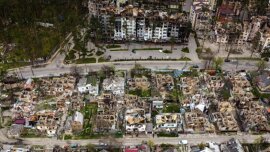On June 27 of this year, immediately after the Prigozhin coup, the New York Times published a new column by Thomas Friedman, What Happened to Putin?
Using artistic techniques, in particular, comparing the events of the Prigogine rebellion with the trailer of the James Bond film, Friedman stands his ground and once again emphasizes the power of Putin, calling him a man "with a heart of stone."
The article portrays Putin as resolute, for example, telling Alexander Lukashenko that he wants to kill his treacherous mercenary commander, "crush him like a bug."
The gist of the whole column is that Friedman says, “ Things get complicated because of Putin’s balance of power with the rest of the world, because we in the West need to fear Putin’s weakness as much as his strength.
You can also get unrest or civil war and Russia's breakup into fiefdoms of warlords/oligarchs.
This is not Putin's defense. This is an expression of rage at what he did to his country, turning it into a time bomb scattered across 11 time zones. Putin has taken the whole world hostage.”
Other Western media, politicians and opinion leaders have also turned the public discourse towards keeping the Putin regime as the lesser evil.
But talk of preserving Putin's regime is just the tip of the iceberg. The real discourse about the geopolitical balance in Eurasia is hidden under the water.
Edward Luttwak, former security adviser to US President Ronald Reagan, said that the United States cannot afford to lose the Russian Federation in this war, as this could lead to its collapse. This, in turn, means that immediately after the destruction of the Russian Federation, Mongolia, Kazakhstan and other countries of Central Asia will come under the control of China.
That is, the West has reached a geopolitical impasse, from which there are theoretically three ways out:
First. Victory over Russia with its further transformation into a normal state, creation of conditions for liberals to come to power, inclusion of Russia in the world economic and political space.
The variant is utopian, since the Russian society has no demand for liberal values and institutions of democracy, and there will be no democratic Russia. On the contrary, in the next 20 years at least, it will be a permanently aggressive totalitarian monster.
Moreover, it would not be superfluous to recall that it was Russia “included” in the economic and legal space, in particular the European one, that unleashed an aggressive war against Ukraine.
Second. Save current mode
The West, supposedly fearing unpredictability (the possible collapse of the Russian Federation after a military defeat or the arrival of radicals), will try to find a formula for preserving the Putin regime.
At the moment, among Western political elites, there is still a very widespread opinion that this can prevent a similar scenario for the development of the political system in the Russian Federation.
But, firstly, the statements and actions that proceeded from such an understanding have already led to very significant reputational losses for a number of leaders of the leading states of Europe and Asia.
These losses could be guaranteed to be avoided if at least an assumption was made about Putin's non-subjectivity.
Secondly, regarding the fear of radicals coming to power, it should be noted that they have already come. The Putin regime is what they are, just in a period of active and already ending mutation .
And there is no option to interfere with this process.
The ideologists and practitioners of the "Russian conservative revolution" have already gone most of the way towards the undivided power of the secret services.
The initiators of the managed revolution are already:
1) organized and carried out the Invasion - a deliberately aggressive war (that is, they passed the most difficult stage in the organizational sense, which we wrote about here ;
2) wage war in a strictly defined way - the most barbaric and criminal in relation to Ukraine and at the same time the most destructive for the existing system in the Russian Federation;
3) they have already made a complete legal “puppetry” of their domestic and foreign policy (and most importantly, the economy) by breaking more than fifty international treaties and thus avoiding economic and political international arbitration;
4) started organizing the Time of Troubles - the disintegration and destruction of the existing system of power in the country and the creation of a public demand for a new model - a new social contract (elements of this process: the Prigozhin rebellion and the explosive activation of radical jingoistic patriots);
5) actively carry out the transformation of the authoritarian Russian state into a super-totalitarian one (more and more repressive laws and methods of their practical application are created literally every day);
6) come close to the transfer of shadow arbitration from the so-called. "feudal" ethnic criminal structures to the centrally controlled so-called. "court" (observe the beginning of the process);
7) they begin to voice a proposal on the need for a new system of building power in the country on the basis of a new constitution with legal (constitutionally fixed) dominance of the special services (we are observing the beginning of the process).
Taking into account the fact that the West cannot objectively somehow interfere with this process, this suggests a third option!
Third. A military victory over Russia understood as the defeat of its invading army located on Ukrainian territory.
At the same time, one will have to de facto agree with the controlled revolution in the Russian Federation and allow the Russian special services to complete the initiated process of transformation into a super-totalitarian state.
To defeat the invading army on Ukrainian territory, give Ukraine the necessary weapons, including aircraft, long-range missiles and other necessary effective weapons.
Don't be afraid of red lines!
The main fear of the West is the loss of control of the central government in the Russian Federation over nuclear weapons. In fact, this is a bluff - a controlled revolution does not provide for this.
The second fear of the West is the use of tactical nuclear weapons by the Putin regime (a controlled revolution does not provide for such an option either, as its speakers insistently say);
The third fear of the West is the actual transfer of Russia's sovereignty to China.
In fact, sovereignty is the true goal of a controlled revolution (and the so-called SVO as its most important tool). Sovereignty is understood as the complete control of the new elite over all processes in the state. And that is why its transfer to China is out of the question.
As Russian bloggers themselves write: “Full sovereignty is the ability of the authorities within the state to do anything with their people, and no one from outside has the right to interfere . ”
It is from such a pragmatic understanding that the West should proceed, especially given that the ideologists of a controlled revolution are trying to secure the status of special services in the new Russian constitution, by analogy with the Guard Corps in Iran. This means that this state of affairs will be fixed for at least 20 years.
The West must agree to build a physical, economic, political, diplomatic and moral-psychological wall between the international coalition of democratic countries and totalitarian Russia.
The most important role in the construction of the "Wall" project should be assigned to Ukraine, which has proven in practice the ability to uphold the democratic values of the civilized world.
In this case, the third option should suit absolutely everyone:
- West
-
consolidates around the leadership of the United States, receiving for many years a geopolitical "scarecrow" in the form of a new super-totalitarian Russia,
-
modernizes its military-industrial complex and conducts reindustrialization,
-
squeezes Russia out of all promising markets,
-
interacts with Russia on its own terms, as it has a successful experience of communications with authoritarian, totalitarian and corrupt regimes.
- Ukraine - liberates territories, integrates into the international distribution of labor, takes on a significant part of the functionality to protect the West from Russia;
- Russia - special services get what they want - undivided power, take control of the situation in the country and nuclear weapons.
***
The criterion of the West's leadership is its decisiveness in times of crisis in world history.
In this case, the ability to ensure future peace in Ukraine on Ukrainian, not Russian, terms.
The whole world is closely watching this, and the slightest weakness can shake this leadership.
The West cannot afford to make a mistake at such outrageously high stakes.
The text of the appeal to the peoples and leaders of democratic states.
Authors:
Vladimir Shevchenko , political scientist, Doctor of Philosophy
Andrey Savarts , analyst, lawyer, author of the telegram channel "Special Opinion"

























